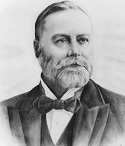
Sir Robert Stanes.
|
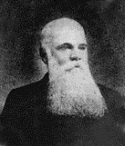
Thomas Stanes.
|
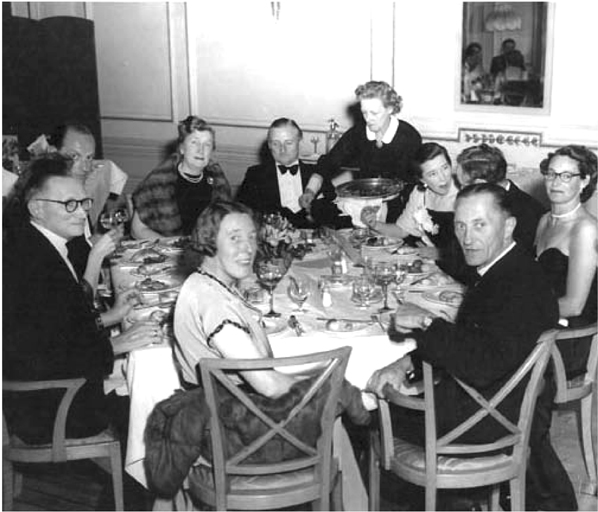
Eric Stanes (facing the camera at right) and C.E. Wootton (first on left) at a formal dinner
|
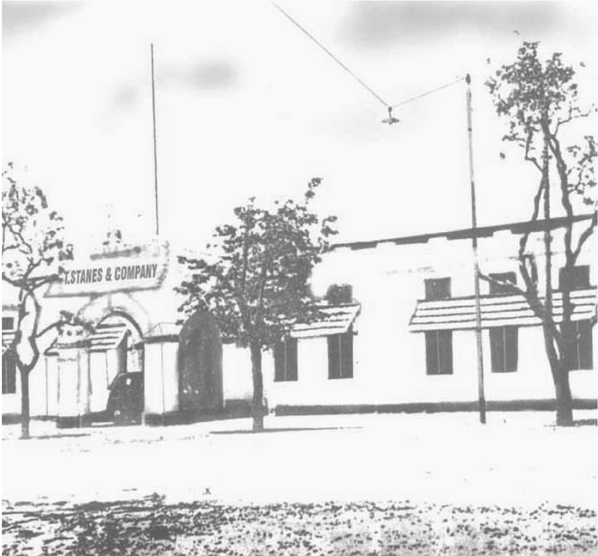
Early view of the Stanes offices, Coimbatore.
|
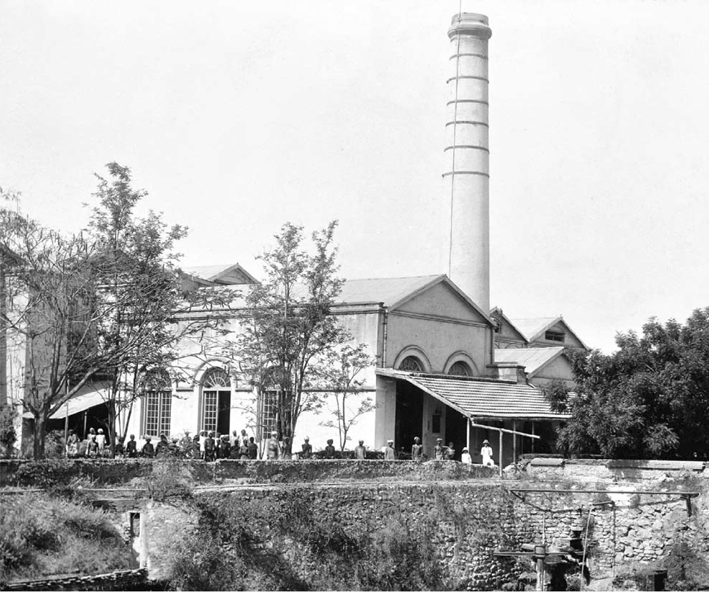
The Coimbatore Spinning and Weaving Mills.
|
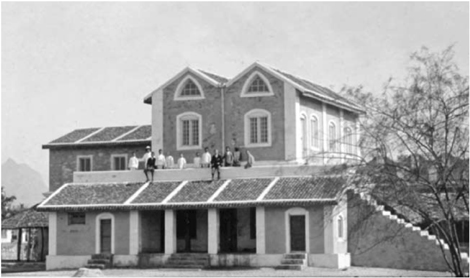
The Stanes school in its early days in Coimbatore.
|
What are the images the name Stanes conjure up? Coffee and tea estates, agro industries, and the Stanes schools (in Coimbatore and Coonoor)? But few recall the four generations of the Stanes family who lived and did business in India for nearly 100 years, sowing the seeds for all this. Building on it, for over half a century now, has been the Amalgamations Group. This is the story historian and journalist Sriram V. weaves into a pictorial history titled Friends of the Earth: the Stanes Story, brought out recently to celebrate the Company's 150th anniversary.
The Stanes story begins with the patriarch, James Stanes senior. Then came his five sons, William, James, Henry, Thomas and Robert, their children and grandchildren. And, after India's independence, it continues with S. Anantharamakrishnan and, later, his sons A. Sivasailam and A. Krishnamoorthy, the present chairman of the Amalgamations Group.
"One of the great traditions at Stanes has been the care for the individual; the respect for the employee," Sriram writes. In 1912, T. Stanes & Co was in all likelihood the first organisation in India to begin a Provident Fund (PF) for its employees, calling it, first, the Pensions and Guarantee Scheme and then, in 1926, the Provident Fund. Any staff member earning Rs. 30 or more had to join the PF with a 5 per cent contribution from his/her salary. And the Company made a matching contribution.
To get ahead of the story, when the time came for the last of the Stanes to sell and move on because, after Independence, nationalisation threatened British interests, Eric Stanes (grandson of Henry, the only son of the patriarch who did not come to India, and son of Herbert who was not successful here) was keen on a buyer who would retain, nurture and nourish the Stanes culture, including its schools. This demand of Eric was more than adequately met by Anantharamakrishnan. 'J' as he was known as among his colleagues had risen from being an accountant at Fraser & Ross to Company Secretary of Simpson & Co (a firm that began business in 1840) and then founded Amalgamations (P) Ltd (1938). with the aim of acquiring businesses in synergy with Simpson's. Through K.S. Vaidyanathan of Paterson & Co., stockbrokers, Eric approached J who was gaining a legendary reputation as a takeover king, asking him to consider acquisition of Stanes. It was a perfect merger of business interests and social philosophy. J was literally a son of the soil who loved to spend time in his farm in Alwarkurichi near Tirunelveli, and kept all his promises of taking Stanes & Co from strength to strength in its core businesses, which were linked to the soil.
* * *
James Stanes Junior set sail for Madras aboard one of his father's ships around 1850. While waiting for his ship to take on cargo, he journeyed by road to Ootacamund which had been praised by the Collector of Coimbatore, John Sullivan, as a ''little bit of home''. James loved the Nilgiris and, purchasing Runnymede Coffee Estate in Coonoor, decided to stay on and grow coffee. Unfortunately, on May 8, 1852, waiting to meet his fiancée, he drowned while bathing beneath a waterfall in Kulhutty. He was buried in the cemetery of St Stephen's Church, Ooty. His grave is one of the oldest marked ones there.
Next to arrive was William who, instead of winding up James Stanes' business, was also taken up with the beauty of the mountains, and not only decided to continue to manage Runnymede, but also acquired Adderley Estate as well. William married into the Scudder family, the American missionaries in Arcot who sowed the seeds of Christian Medical College, Vellore.
The next Stanes to arrive in Coonoor was Thomas. He landed in Madras on June 26, 1855, but before long took over the management of Adderley Estate. With three sons in India, the patriarch sailed from the UK in 1857 to meet them. Neither age nor the Revolt deterred him. He was 61. Leaving India after a stay of six months in 1857, he made up his mind to send out his youngest son Robert, 17. Like his brothers, James and William, Robert too fell in love with the Nilgiris. While he was being trained in coffee cultivation, he found it boring work. But when the idea occurred for Stanes to start their own coffee curing facility in Coimbatore, Robert was the man for the job. In 1861, Robert started the Stanes Coffee Curing Works (SCCW) and the business soon expanded. By 1876, SCCW was exporting a record £ 1,633,395 worth of coffee. Robert continuously worked towards process improvement and became the first to introduce mechanisation.
In 1887, the third James (Jimmy) Stanes, son of William, came to India after studying at the Royal Agricultural College, Cirencester. His brother William (Willie) followed the next year. They acquired estates, both jointly and singly, and inherited Runnymede as well. Capital for all the estates that the Stanes family bought in India was provided by Stanes & Watson, James Senior's firm in England. James Senior was proud of his sons, and described himself as an "owner of coffee estates".
While Willie inclined towards the religious life and took to missionary work, Jimmy flourished, owning at one time as many as 35 estates, stretching all the way from the Nilgiris to the Shevaroys and Palani Hills. It is to Jimmy's credit that plantations growing coffee shifted to tea in 1875 to meet the challenge of the blight which had wiped out coffee plantations. When all of a sudden, Stanes & Watson collapsed, due to financial participation in the foolhardy gold rush in the Nilgiris, it was the youngest of the brothers, Robert Stanes, who suffered. He was left with only Rs. 500 to start all over again. His elder brother Thomas, who had acquired Colacumbay, comprising 200 acres touched by the fungus, merely lent his name to T. Stanes & Co. and that has lasted till date. Along with Robert, there was Keith of the London-based Arbuthnot, Latham & Co and elder brother William's son-in-law Ramsay who helped to liquidate all the liabilities by the late-1890s. In November 1888, T. Stanes & Co and Arbuthnot, Latham & Co laid the foundation stone for the Coimbatore Spinning & Weaving Co Ltd, and it opened on August 18, 1890, the first in South India and the precursor of the industrialisation of Coimbatore District.
Robert Stanes also worked towards developing community needs like having a swimming bath rebuilt in 1861 at his expense and donating, along with others, the highest amount of Rs. 50 to the Coimbatore Club in 1873. Around 1862, he started a Sunday school for neglected Anglo-Indian children near the main market in Coimbatore. The school moved to near the Railway Station, where it functioned for 50 years, and then shifted to its present location.
In 1864, at the age of 23, Robert Stanes was made the Coimbatore Municipal Council's first Chairman. He married Harriet Huntingdon Harris in Bristol in 1870 and the couple returned to India the same year. Robert was also instrumental in part for founding the Union Church in Coonoor in 1878. Robert and Harriet had eight children between 1871 and 1884, of whom Fred joined the Stanes firm in 1899 and had a long and successful career in India. The name of Robert Stanes (he came to India in 1858) endures among all the Stanes for promoting causes dear to his heart like education and other charities. This was recognised by the Government of India awarding him the Kaiser-I-Hind gold medal in 1914. He was knighted in 1920. He lived up to the age of 95, passing away in September 1936 in Coonoor. His funeral service at All Saints Church was well attended by many Indians at a time when sentiments against the British were strong.
In 1921, a syndicate with T. Stanes & Co Ltd as Managing Agents, was formed to acquire Elak Rubber Estate. This was to remain with the company till 1940. The estate business was also restructured in 1922. The United Nilgiri Tea Estate Ltd was formed that year, comprising Chamraj, Rocklands and Allada Valley Estates. South Devarshola was bought in 1926 and Kodari in 1928. The Korakundah Estate was bought much later, in 1955. In 1926, the fertiliser department benefitted when C.E. Wootton joined as chemist-in-charge. He became Director of the Company in 1939.
(To be concluded)
|